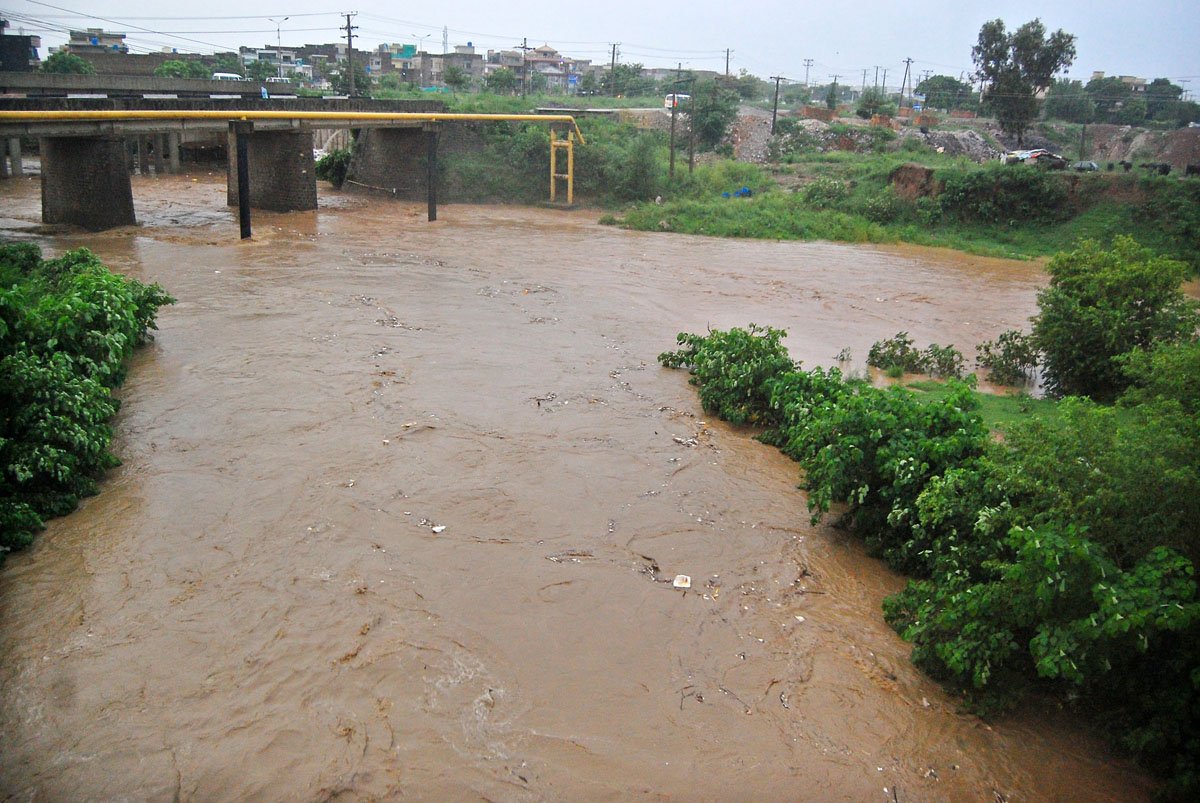
After a delay of over 16 years, a new feasibility has been sought to start work on the 168-kilometre-long signal-free Leh Expressway and Flood Channel around Nullah Leh.
It has been over a decade since the Leh Expressway and Flood Channel project was envisaged to create an alternative route for traffic and to divert open sewage through safe sewers and trenches to do away with flooding in Nullah Leh during monsoon. The vital project, however, still awaits implementation with both provincial and federal governments failing to arrange funds.
The cost of the project is estimated to have surpassed Rs100 billion after the government failed to start work on the vital project for too long. This is excluding the estimated sum of Rs30 billion, which will be required for the land acquisition.
Sources said that a proposal has been floated to lay 16-kilometre-long concrete sewertrenches on both sides of the Nullah Leh from the IJ Principal Road in Islamabad to the Swan Defence Chowk to dispose of the sewage and reduce pollution caused by open drainage.
Sources said that Rawalpindi Development Authority (RDA) has formed two teams to prepare a survey report regarding the project.
According to the sources, a meeting chaired by the Punjab chief secretary discussed the delayed project. Representatives of RDA, WASA Rawalpindi, WASA Lahore, NESPAK, and other related departments attended the meeting.
The meeting was told the project cost has escalated to Rs100 billion owing to the inordinate delay caused by a lack of funds.
It was proposed in the meeting that in the first phase, sewer trunks should be constructed on both sides of the Nullah Leh so that sewage from Rawalpindi city and Cantonment could be diverted into them. This will help stop the direct disposal of sewage into the Nullah Leh, which will be left open for the passage of rain and flood water.
This will also help overcome the pollution caused by the direct disposal of sewage into Nullah Leh, sources said.
RDA Director-General Saif Anwer Paracha confirmed the suggestion for the construction of the project in two phases and said that the Punjab chief secretary has ordered to complete the project in phases due to the heavy cost.
He said that it was important to overcome pollution first so that flooding could be stopped during monsoon season.
He said that the Capital Development Authority will also be taken in the loop on the project so that open sewage from Islamabad can be shifted to the sewerage trenches. He said that they will soon hold a meeting with CDA officials.
The project which was supposed to cost Rs17 billion back in 2006-2007, under former president General Pervez Musharraf’s regime, will now cost more than Rs100 billion.
The Nullah Leh Expressway project initially envisaged in 2007 had been estimated to cost Rs17 billion which was put on hold in 2008 when the Pakistan Muslim League-Nawaz government came to power. Since then, no headway had been made on the vital project and its estimated cost has risen manifolds. In case of further delay, an exponential increase in its cost is expected to swell further.
The Nullah Leh will remain open while water flow during the monsoon season, an estimated 0.1 million cusecs, will flow through it.
Earlier, it was envisaged that the Nullah Leh will have 12 feet wide roads on both sides with barriers to protect it from the intrusion of humans and animals. Trunk sewers were to be laid under the Leh Expressway to transport wastewater from the city. The sewers will join together in the Soan River from where the wastewater will be transported to the WASA treatment plant in Gorakhpur.
After treatment, the treated water will be channelled to the Soan River again which will be used for irrigation.
The sewage treatment plant was envisaged in 2005 and at that time, its estimated cost was put at Rs15 billion, which has now increased to Rs30 billion.
Earlier, the Punjab government had given formal approval for setting up a sewage treatment plant along with a 20-kilometre-long sewerage tunnel for the safe disposal of wastewater that aims to minimise environmental pollution in Rawalpindi.
Officials had said that the Asian Development Bank has agreed to provide the required funding for the project, which will cost Rs30 billion.
Earlier, the Executive Committee National Economic Council (ECNEC) approved a sewage treatment plant for Rawalpindi.
Published in The Express Tribune, March 16th, 2023.


















COMMENTS
Comments are moderated and generally will be posted if they are on-topic and not abusive.
For more information, please see our Comments FAQ